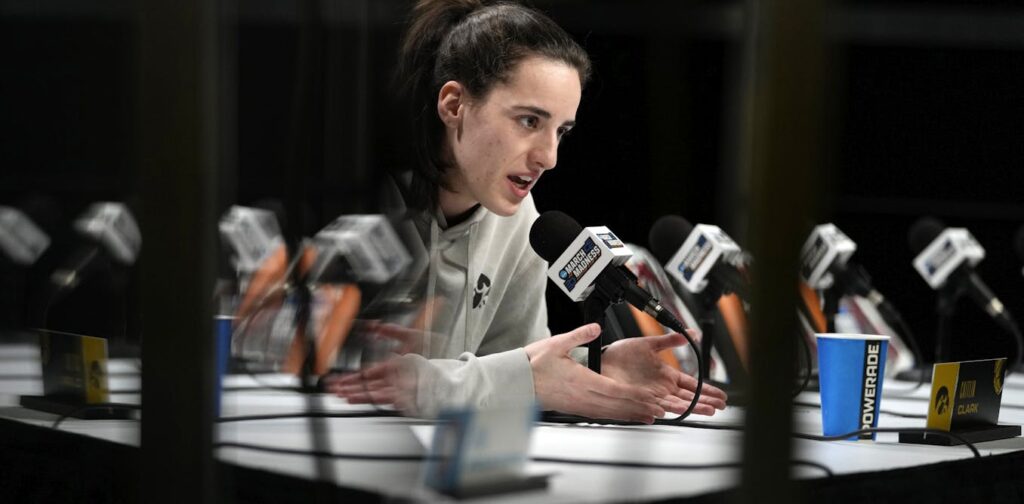Sports media's misogyny was alive and well this month.
U.S. star basketball players Caitlin Clark and Angel Reese have been selected from the National Collegiate Athletic Association (NCAA) Sweet 16 to the Women's National Basketball Association (WNBA) draft in just a few weeks. This was discovered through a reporter's investigation. They themselves have publicly apologized for reporting on women.
First, Los Angeles Times reporter Ben Bolch drew criticism for describing Reese's Louisiana State University (LSU) team as “dirty debutantes” in a since-edited NCAA Championship matchup preview.
LSU coach Kim Mulkey slammed the article and those who didn't criticize it. “If you don't think it's sexism, you're denying sexism,” she says.
The Times quickly retracted its comment, and Borch posted: apology With a promise to “do better.”
This doesn't stop Indianapolis Star columnist Greg Doyle from learning a similar lesson after his inappropriate exchange with WNBA No. 1 draft pick Clark at a press conference, and more. provoked another remark. apology.
It is also a familiar problem
Australia is no stranger to moments like this either. I still can't believe it was this century that Age columnist Greg Bohm wrote, “Women's football is a joke…women's cricket is not better.”
Also: Kim Clijsters slams Todd Woodbridge over inappropriate texts about her body, Australian Open commentator asks Canadian tennis player Eugenie Bouchard to 'twirl her around' There was also a scene.
Just last year, Australian cricketer Maitlin Brown endured being labeled a “little Barbie doll” by a reporter on the sidelines.
And it's not just female athletes who are suppressing it. In 2022, AFL journalist Tom Morris was sacked for making sexist and homophobic comments about his female colleagues.
Read more: From forced kisses to power imbalances, violence against women in sport is endemic
Problems with a male-dominated industry
The problem is obvious. Today's sports media is overwhelmingly dominated by men.
Only 10% of Australian sportswriters are women (the stats for the US and Canada aren't much better).
Women are constantly reminded that sports are a male domain and those who participate are exposed to a predominantly male perspective and are often ridiculed.
While the overt sexism and trivialization that once routinely shaped women's sports reporting has diminished, subtle but no less pernicious forms of marginalization remain.
Women's sports are significantly less likely to receive detailed analysis than men's sports. Reports tend to emphasize effort rather than performance, and men are significantly more likely to be characterized as “liked.''
Sometimes it is unintentionally overshadowed by praise. For example, my research on media coverage of female skateboarding “geniuses” at the Tokyo Olympics found that while the media praised teenage medalists as evidence of “girl power” at work, the coverage remained It turns out that it largely ignores the structural issues that are affecting the progress of many women. Whether it's skating or something else.
Read more: Is this the beginning of a new era in women's sport?
What is the solution?
Women researchers and journalists have long provided solutions to the need for more female voices in sports reporting.
Diverse perspectives can produce better outcomes for women. Please contact the Medical Research Department. Sports media needs the voices of women who are not only experts in the sport, but also know what it's like to be a woman in the sport.
We've already seen glimpses of the magic that can happen when women are moved from the sidelines to the desk.
During the same NCAA tournament in which the two reporters apologized, ESPN convened an all-female panel of former players and sports journalists to analyze the tournament.
The trio received considerable praise for their coverage of the event, culminating in the most-watched game (men's or women's) in ESPN history.
A great illustration of the power of the female perspective was the panel's preview of the showdown between Clark and Reese in the Sweet 16, which would set ratings records.
Just before the game began, the trio gave a nod to the sport's past players, telling them that it was their night too because they made the game.
This can only come from a woman who knows what it's like to play and report on a sport that has historically struggled to get attention and respect.
Australia got a glimpse of its potential in March when an all-female commentary team covered rounds of the A-League, the first Australian professional league to do so.
Still, commentator Kate Allman said it's no surprise it took until 2024 to get there, given the “maze of glass ceilings” he encountered during his career.
Now we are hurtling toward yet another Olympics. The Olympics will see success for Australian women on the soccer field, basketball court and swimming pool.
More women need to take up their efforts. And more leadership efforts are needed to show young women the potential for a career in sports media.
This is an opportunity to show that sports media can belong to women too. And they can help improve the coverage of athletes who deserve better.


